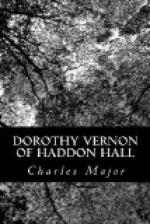But what shall we say of Dorothy’s conduct? I fancy I can hear you mutter, “This Dorothy Vernon must have been a bold, immodest, brazen girl.” Nothing of the sort. Dare you of the cold blood—if perchance there be any with that curse in their veins who read these lines—dare you, I say, lift your voice against the blessed heat in others which is but a greater, stronger, warmer spark of God’s own soul than you possess or than you can comprehend? “Evil often comes of it,” I hear you say. That I freely admit; and evil comes from eating too much bread, and from hearing too much preaching. But the universe, from the humblest blade of grass to the infinite essence of God, exists because of that warmth which the mawkish world contemns. Is the iron immodest when it creeps to the lodestone and clings to its side? Is the hen bird brazen when she flutters to her mate responsive to his compelling woo-song? Is the seed immodest when it sinks into the ground and swells with budding life? Is the cloud bold when it softens into rain and falls to earth because it has no other choice? or is it brazen when it nestles for a time on the bosom of heaven’s arched dome and sinking into the fathomless depths of a blue black infinity ceases to be itself? Is the human soul immodest when, drawn by a force it cannot resist, it seeks a stronger soul which absorbs its ego as the blue sky absorbs the floating cloud, as the warm earth swells the seed, as the magnet draws the iron? All these are of one quality. The iron, the seed, the cloud, and the soul of man are what they are, do what they do, love as they love, live as they live, and die as they die because they must—because they have no other choice. We think we are free because at times we act as we please, forgetting that God gives us the “please,” and that every act of our being is but the result of a dictated motive. Dorothy was not immodest. This was her case. She was the iron, the seed, the cloud, and the rain. You, too, are the iron, the seed, the cloud, and the rain. It is only human vanity which prompts you to believe that you are yourself and that you are free. Do you find any freedom in this world save that which you fondly believe to exist within yourself? Self! There is but one self, God. I have been told that the people of the East call Him Brahma. The word, it is said, means “Breath,” “Inspiration,” “All.” I have felt that the beautiful pagan thought has truth in it; but my conscience and my priest tell me rather to cling to truths I have than to fly to others that I know not of. As a result, I shall probably die orthodox and mistaken.
CHAPTER III
The pitcher goes to the well.
Dorothy and I went to the inn parlors, where I received a cordial welcome from my cousin, Lady Crawford. After our greeting, Dorothy came toward me leading the fair, pale girl whom I had seen in the courtyard.




